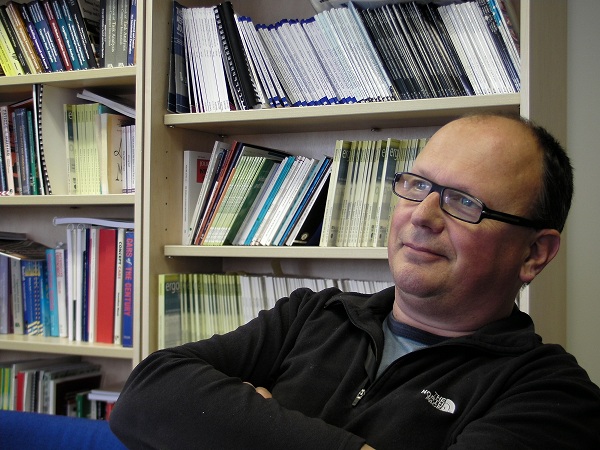 Toulouse, France October 29-31, 2012 |
4th International Conference on Human-Centred
|
 Toulouse, France October 29-31, 2012 |
4th International Conference on Human-Centred
|
Prof. Emilia Mendes
Blekinge Institute of Technology, Sweden
A cornerstone of software project management is effort estimation, the process by which effort is forecasted and used as basis to predict costs and allocate resources effectively, so enabling projects to be delivered on time and within budget. Effort estimation is a very complex domain where the relationship between factors is non-deterministic and has an inherently uncertain nature, and where corresponding decisions and predictions require reasoning with uncertainty. Most studies in this field, however, have to date investigated ways to improve software effort estimation by proposing and comparing techniques to build effort prediction models where such models are built solely from data on past software projects - data-driven models. The drawback with such approach is threefold: first, it ignores the explicit inclusion of uncertainty, which is inherent to the effort estimation domain, into such models; second, it ignores the explicit representation of causal relationships between factors; third, it relies solely on the variables being part of the dataset used for model building, under the assumption that those variables represent the fundamental factors within the context of software effort prediction. Recently, as part of a New Zealand and later on Brazilian government-funded projects, we investigated the use of an expert-centred approach in combination with a technique that enables the explicit inclusion of uncertainty and causal relationships as means to improve software effort estimation. This talk will first provide an overview of the effort estimation process, followed by the discussion of how an expert-centred approach to improving such process can be advantageous to software companies. In addition, I will also detail my experience building and validating six different expert-based effort estimation models for ICT companies in New Zealand and Brazil. Post-mortem interviews with the participating companies showed that they found the entire process extremely beneficial and worthwhile, and that all the models created remained in use by those companies. Finally, the methodology focus of this talk, which focuses on expert knowledge elicitation and participation, can be employed not only to improve a software effort estimation process, but also to improve other software development processes.
About Emilia Mendes 
Emilia Mendes is Professor in Software Engineering at the Blekinge Institute of Technology (Sweden). She obtained her PhD in Computer Science from the University of Southampton (UK) in 1999, and then initiated her full time academic career at the Computer Science Department at the University of Auckland (NZ), where she worked for 12 years. After leaving NZ, and prior to moving to Sweden, she was Associate Professor at Zayed University (UAE) for a year. Her research is inter-disciplinary, encompassing four disciplines - Web & Software measurement &metrics, Empirical Software & Web Engineering, IT/Computer Science & Software/Web Engineering education, and Hypertext. To date she has published over 170 refereed publications, which include two books (one edited (2005 - Web Engineering) and one authored (2007 - Cost Estimation Techniques for Web Projects)). She worked in the ICT industry for ten years as programmer, business analyst and project manager prior to moving to the UK in the end of 1995 to initiate her PhD studies.
Prof. Neville Stanton
University of Southampt, UK
Human Factors Engineering abounds with methods for analysing human activity performing tasks with tools in pursuits of goals. These methods have been extended to analyse tasks that might exist in the future to anticipate what might be required of the software and technology to support those activities. In this way, Human Factors Engineering has a very useful role to play in design. Understanding user needs is more complex than asking users what they need. Simply presenting a list of what users say they want often leads to systems that users don't want. Like the Babel fish, Human Factors Engineering has to perform a complex translation, interpreting what is said and done by a range of users performing a range of tasks, using theories of human performance to anticipate how future requirements might be met. Analysing what is done now does not automatically help anticipate what should be done in the future. Rather, the skilled Human Factors Engineer needs to question the existence of the socio-technical system in its current form and model alternate future systems. This approach can help take design thinking and practice beyond incremental improvements towards new approaches for interaction. Examples of methods for qualitative and quantitative assessment of current and future systems will be presented together with case examples of how Human Factors Engineering can make a positive contribution to design requirements specification for software and technology based interaction.
About Neville Stanton Professor Neville Stanton holds the Chair in Human Factors Engineering in the Faculty of Engineering and the Environment at the University of Southampton. He has co-authored and edited more than 20 books and 160 journal papers on this topic over the past 25 years. Neville's research interests include Team Working and Distributed Cognition, Systems Error and Reliability Analysis, Socio-Technical Systems Design and Human Factors Methods. The Institution of Electrical Engineering (now the IET) awarded him the Informatics Divisional Premium Award in 1998 for his research on system safety. The Ergonomics Society (now the IE&HF) awarded him the President's medal in 2008 and the Otto Edholm medal in 2001 for his contribution to basic and applied ergonomics research. The Royal Aeronautical Society awarded him the Hodgson Medal and Bronze Award in 2007 with colleagues for their work on flight deck safety. Professor Stanton an editor of Ergonomics and on the editorial board of Theoretical Issues in Ergonomics Science. He is a Fellow and Chartered Occupational Psychologist registered with The British Psychological Society, a Fellow of The Ergonomics Society and a member of the Institution of Engineering and Technology. He has a BSc in Occupational Psychology from University of Hull and a PhD in Human Factors from Aston University. Professor Stanton advises organisations on Human Factors and was an expert witness for Network Rail in the civil litigation following the Ladbroke Grove Rail inquiry.
Professor Neville Stanton holds the Chair in Human Factors Engineering in the Faculty of Engineering and the Environment at the University of Southampton. He has co-authored and edited more than 20 books and 160 journal papers on this topic over the past 25 years. Neville's research interests include Team Working and Distributed Cognition, Systems Error and Reliability Analysis, Socio-Technical Systems Design and Human Factors Methods. The Institution of Electrical Engineering (now the IET) awarded him the Informatics Divisional Premium Award in 1998 for his research on system safety. The Ergonomics Society (now the IE&HF) awarded him the President's medal in 2008 and the Otto Edholm medal in 2001 for his contribution to basic and applied ergonomics research. The Royal Aeronautical Society awarded him the Hodgson Medal and Bronze Award in 2007 with colleagues for their work on flight deck safety. Professor Stanton an editor of Ergonomics and on the editorial board of Theoretical Issues in Ergonomics Science. He is a Fellow and Chartered Occupational Psychologist registered with The British Psychological Society, a Fellow of The Ergonomics Society and a member of the Institution of Engineering and Technology. He has a BSc in Occupational Psychology from University of Hull and a PhD in Human Factors from Aston University. Professor Stanton advises organisations on Human Factors and was an expert witness for Network Rail in the civil litigation following the Ladbroke Grove Rail inquiry.